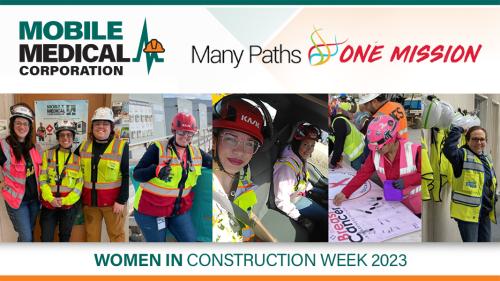In 2023, the percentage of construction workers who are women is the highest it's ever been. Although the number of women in construction has been steadily rising for decades now, there has been particularly significant growth over the last six or seven years.
Towards the end of 2022, women reportedly made up approximately 14% of the total construction workforce in the US, with more than a million women working in a variety of different roles in the construction industry.
According to the National Association of Women in Construction (NAWIC), women make up a large percentage of employees working in sales and office (61%), and professional and management roles (44%), with smaller percentages working in service occupations (21%) and other positions (7%).
To celebrate and promote the diverse and growing number of roles women play in the construction industry, the NAWIC holds Women in Construction Week (WIC Week) every first week of March. This year's WIC Week will take place from March 5th to 11th.
The theme of WIC Week this year is "Many Paths, One Mission." This theme honors the many different paths women have taken toward the common goal of strengthening the role and success of women in construction.
The History of Women in Construction Week
Women in Construction Week wouldn't exist without the hard work of the numerous women who paved the way for women to formally enter the construction industry, an industry long dominated by — and still dominated by — men.
When Did Women Start Working in Construction?
The history of women in construction goes back further than you might think — there are written records of women construction workers dating all the way back to 13th century Spain.
There's also evidence of women working as everything from skilled laborers to tradespeople across Europe in the centuries that followed.
However, women's modern role in the construction industry didn't really start to take shape until World War II, when large numbers of women entered the workforce and took over various jobs traditionally held by men, including construction, while tens of thousands of men were away fighting the war.
Unfortunately, after the war, many of these pioneering women in the workforce were fired and replaced by men coming home from the war, and it wasn't until the 1960s that laws started to be passed to protect women in the workforce.
These laws started to make it easier for more women to enter, and stay in, the construction industry, and by the early 1970s women made up nearly 7% of the construction workforce.
As we mentioned earlier, that percentage has nearly doubled in the decades since, but there's still plenty of room for growth and progress, especially considering the fact that the average woman in the construction industry makes 95.5% of what a man in the same role makes.
Although this gender pay gap is less than what it is in other sectors, it shows the continued need for professional organizations and events, such as the NAWIC and WIC Week, dedicated to driving career growth and development for women in construction.
More About Women in Construction Week
The NAWIC launched the first WIC Week in September of 1998, and the event has expanded every year since and has gained industry-wide recognition for building a strong community of women in construction.
WIC Week was eventually moved permanently to March, so that it would take place during Women's History Month.
There are many different local NAWIC chapters across the country that hold special events during this week, including everything from presentations at high schools and job site tours, to networking luncheons and various virtual events.
The common goal of all these events is to continue making headway for women in construction by promoting awareness of the important roles they play in this traditionally male-dominated industry.
The NAWIC encourages construction firms and companies of all types and sizes to participate in WIC Week, not only to show support for the women who work for them, but to help make other women aware of the opportunities available to them in construction.
Those interested in getting involved can look up their local NAWIC Chapter to find WIC Week events in their area.
Women in Construction Week Events (2023)
Aside from the numerous local Women in Construction Week events hosted by the NAWIC's 100+ chapters taking place across the country this year, there are a few national virtual WIC Week events that you can sign up for and attend via Zoom:
- Tradeswomen Panel (March 2nd, 4:00 p.m. CT)
- WIC Week Kick Off (March 4th, 5:00 p.m. CT)
- WIC Hot Topic Panel (March 6th, 1:00 p.m. CT)
- Establish Balance and Avoid Burnout (March 9th, 12:30 p.m. CT)
- WIC Week Toast and Recap (March 11th, 5:00 p.m. CT)
Mobile Medical's Involvement in Women In Construction Week
Mobile Medical Corporation (MMC) is a certified Women's Business Enterprise that supports WIC Week and its mission of raising awareness about the important and growing number of roles women play in construction, and the many opportunities available to women in the industry.
As a 100% women-owned business, MMC celebrates this week as an opportunity to highlight the importance of providing women in construction with a high level of occupational health and safety services, tailored to the unique hazards of their professional roles.
More About Mobile Medical Corporation
Mobile Medical was founded in 1990 by Cynthia J. Latsko, President and Chief Executive Officer.
MMC's leadership team also includes:
- Dr. Valerie Lint of St. Luke's Hospital, On-site Medical Division Medical Director in Maumee, Ohio
- Marianne Karg, Vice President
- Kelly Wilhelm, Director of Employer Health Services.
MMC provides fully customizable on-site medical services to promote and support occupational health and safety for both men and women in construction.
We're proud to say we have our highest number of women working on-site jobs at construction sites across the country, and we're committed to doing everything we can to help them grow and develop in their careers in the construction industry!
Check out some pictures of the MMC WIC in action at sites across the country.



